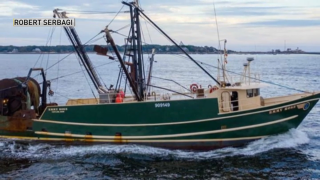
A fishing vessel that sank in New England, resulting in the loss of all four fishermen, likely capsized because of poor drainage of seawater from the rear deck and hatches that weren't watertight, investigators said.
The National Transportation Safety Board called Tuesday for stepped up inspections and renewed its call for personal locator beacons for each crew member. The agency first made that recommendation after the loss of the cargo vessel El Faro and 33 sailors in 2015.
NTSB Chair Jennifer Homendy urged fishing boat operators to purchase the individual radio beacons for crew members.
"Don't wait for a mandate from the Coast Guard," Homendy said in a written statement. "If the Emmy Rose crew had access to these devices, perhaps some of them would still be with us today.''
Get New England news, weather forecasts and entertainment stories to your inbox. Sign up for NECN newsletters.
The tragedy unfolded as the Portland-based Emmy Rose was headed to Gloucester, Massachusetts, to offload an estimated 45,000 pounds of fish in November 2020.
A crew member told his girlfriend in a phone call that it was the 82-foot vessel's biggest catch, and she told investigators that she heard ebullient crewmembers laughing and enjoying themselves in the background.
Hours later, early on Nov. 23, the vessel's automated distress beacon signaled. The Emmy Rose disappeared without a radio distress call.
Local
The Coast Guard dispatched a cutter and a helicopter, then other boats and aircraft, to the area about 25 miles east of Provincetown, Massachusetts. Rescuers found an oil sheen, an empty life raft and some debris. The fishermen were never recovered.
With a forecast for gusts up to 25 knots and sea levels of 5 to 8 feet, the Emmy Rose was returning to shore in conditions that could have put a trawler in peril with waves splashing onto the rear deck. The NTSB said seawater likely accumulated on the vessel's rear deck, failed to drain properly and then poured into the vessel through hatches that weren't watertight, making the vessel less stable.
The Emmy Rose was more susceptible to capsize because of its design and modifications, the NTSB said. The vessel was originally built for shrimping in the Gulf of Mexico and was modified for trawling for fish in New England waters.
"NTSB investigators found that at the time of the sinking, the Emmy Rose likely did not meet existing stability criteria, making it more susceptible to capsizing," the agency's report said.
The NTSB cannot mandate changes, but it recommended inspections of port covers designed to drain water from the deck and watertight hatches, along with individual radio beacons for crew members. The Coast Guard didn't immediately respond to a call seeking comment in Wednesday.
Commercial fishing vessels are required to have an automated emergency beacon that floats free and signals rescuers. But individuals are not required to have them.
A judge awarded nearly $1 million in damages to the families of the fishermen. U.S. District Judge John Woodcock ordered the distribution of the insurance proceeds from boat owner, Boat Aaron & Melissa Inc.
Get updates on what's happening in New England to your inbox. Sign up for our News Headlines newsletter.



